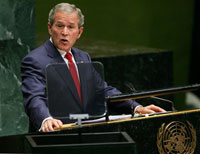Bush returns to issues of peace struggle at U.N. General Assembly meeting
U.S. Presidnet Bush plans to return to issues of peace struggle at the yearly U.N. General Assembly meeting in New York. Bush will first meeti with Palestinian leaders, President Mahmoud Abbas and Prime Minister Salam Fayyad. According to Bush, the two officials try to create a democratic society within the rule of law.

Afterwards, Bush will get an update on the peace process from an old friend of his - former British prime minister Tony Blair. Blair is now a Mideast envoy for a coalition of four partners - the United States, the United Nations, the European Union and Russia. He just returned from the region.
Bush is trying to build international support for a Mideast peace conference that his administration plans to hold this fall. Many Arab states, including some U.S. allies, have been skeptical about the precise mission of the meeting and have sought more details.
"I think that there is a sense of momentum in support of the Palestinians and the Israelis in their efforts to end the conflict," U.S. Secretary of State Condoleezza Rice said Sunday.
Rice said that key Arab nations, including Syria, would be invited to Bush's planned Mideast peace conference this fall and expressed hope they would attend.
Formal invitations have not been issued yet but Rice said Sunday it "would be natural" for Syria, Saudi Arabia and 10 other Arab League members looking at a broad peace deal with Israel to participate despite their hostility to the Jewish state.
More broadly, Bush this week will frame the Mideast conflict as the center of a broad struggle for freedom - from terror, disease, poverty and illiteracy.
That will be the theme of his speech on Tuesday to other leaders from around the world.
"Sometimes people will say these are values of the West, or values of the United States, or values that this president is trying to promote _ all of those are true," said Michael Kozak, senior director for democracy and human rights at the National Security Council. "But they also are universal values ... These are values that all U.N. members have signed on to."
Meanwhile, as the conflict over borders, refugees and holy land between Israelis and Palestinians carries on, Bush is running out of time to broker progress.
His meeting with the Palestinian leaders reminds the world that the U.S. peace effort has the full force of the White House, said Linda Jamison, a senior fellow on multilateral affairs at the Center for Strategic and International Studies.
"The fact that he's doing this is a very strong signal to all the players that there might be some momentum," Jamison said.
The president's broader advocacy of liberty is a staple of his speeches. Still, it is important for him to restate it at the world forum, Jamison said.
"Bush doesn't have that many chances to speak right to the world community," she said. "He doesn't have that many chances to leap over all the distractions of Washington politics ... He's got to take every advantage of it. I'm not sure he has in the past."
Bush also meets Monday with Brazilian President Luiz Inacio Lula da Silva. Talks are expected to focus on a stalled global trade pact.
In the evening, Bush will attend a dinner on global climate change held by U.N. Secretary-General Ban Ki-moon. Bush had no plans to attend Ban's all-day summit on climate change earlier Monday, although Rice was expected to make remarks there.
Subscribe to Pravda.Ru Telegram channel, Facebook, RSS!





